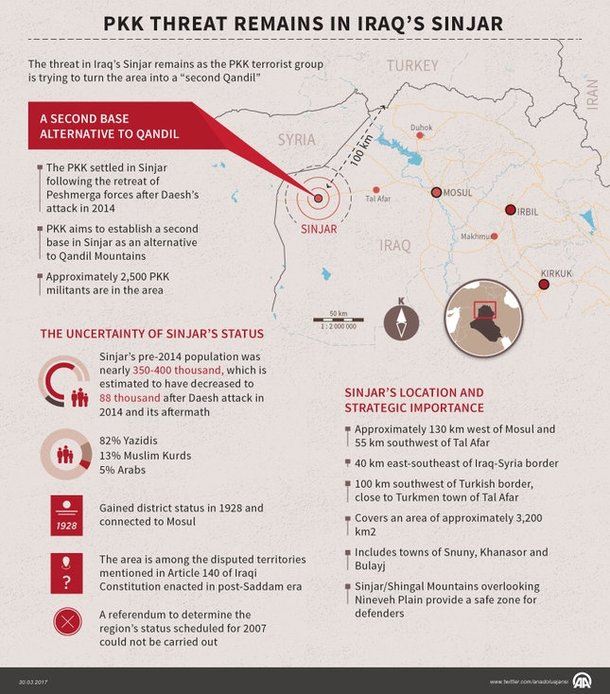Located 130 kilometers west of Iraq's second largest city Mosul and 55 kilometers southwest of the predominantly Turkmen town of Tal Afar, Sinjar became a district of Mosul Province in 1928.
As part of a general Arabization policy during Iraq's ousted leader Saddam Hussein's rule, a significant number of Arab tribes were settled in the area, which was inhabited mainly by Yazidis, Kurds and a small number of Arabs.
Following the U.S invasion of Iraq, this policy was reversed in order to expel Arabs from the region.
Prior to the Daesh attack in June 2014, the population of the district was between 350,000 and 400,000. Of this number, 82 percent were Yazidis, 13 percent were Muslim Kurds and five percent were Arabs, which also include Christians and Kakais. Covering 3,200 square kilometers, the district includes the towns of Snuny, Khanasor and Bulayj.
Following the Daesh attack and atrocities committed against the Yazidi population, the population is currently estimated at 88,000, with most of the former residents fleeing to KRG-controlled areas in Iraq and to Turkey.
As of November 2016, 25,492 Yazidi families were settled in camps controlled by the KRG, whereas 7,500 families migrated to Turkey, Syria and Europe. The number of families located outside of camps in Iraq was 23,905.
Around 300,000 people were displaced during the 15-month-long Daesh occupation of Sinjar.
Currently there are checkpoints erected both by KRG leader Massoud Barzani's Kurdistan Democratic Party (KDP) and the PKK, causing problems for civilians in daily life.
The area, which is known as Sinjar by Arabs and Turkmens and Shingal as Kurds, a Kurdish dialect native to the Behdinan region is commonly spoken.

Sinjar's disputed status
The area is among the disputed territories mentioned in Article 140 of Iraq's post-Saddam era constitution. The referendum determined that the status of the region could not be finalized in 2007.
A U.N. report on Sinjar stated that Yazidis and Kurds overwhelmingly sought for the region to be included in the KRG, whereas Arabs object this ambition.
The KDP remains the most powerful political party in the area, despite the control of Yazidi settlements, where control is currently divided between Peshmerga forces and the PKK.
Mir Tahsin Sait Beg, a religious leader of the world's Yazidis and a prominent figure in Sinjar, says that Yazidis should be controlled by the KRG and it is essential for locals that the PKK evacuate Sinjar.
The Protection Force of Ezidkhan (HPE, also known as HPŞ), the largest but less active Yazidi militia led by the region's prominent figure Haydar Shesho, was also attached to KRG's Peshmerga Ministry of the KRG in 2017 as a separate unit its own insignia and 2,500 armed men.
PKK aims transforming Sinjar into second base
Yazidis, which were more discriminated against by the Saddam regime in comparison to other ethnic-religious groups, became a community exploited by the PKK after the terrorist group increased propaganda efforts targeting the Yazidi community after 1993.
The PKK aimed to transform Sinjar into a second headquarters, an alternative to Qandil Mountains near the border with Iran, using the Daesh invasion and the KRG's partial failure as a pretext.
The terrorist group garnered sympathy and support from the Western public opinion through the use of propaganda based on the PKK's women's branch – the Women's Protection Units (YPJ) – deployed in the region as Daesh was specifically targeting Yazidi women.
Sinjar remains a strategic location between the areas inhabited by Kurds to its northeast and northwest, which fall into the jurisdiction of Iraq and Syria, respectively. The town borders the northeastern Syrian towns of Qamishli and Hasakah, which are controlled by the PKK's Syrian offshoot the PYD.
In March, PKK-aligned groups and Rojava Peshmerga forces clashed in Khanasor, increasing tensions between the two parties.
Several statements also point to the Iraqi government's aim of deploying a predominantly-Shiite Hashd al-Shaabi militia to the region to ensure security, which would likely increase ethnic-religious tensions in the area and pose threat to the KRG forces.
Meanwhile, the Gorran Movement in KRG, which is the main opposition and second largest party in the parliament, opposes to the use of force by the KRG to remove the PKK from Sinjar.